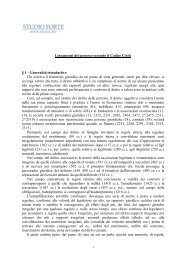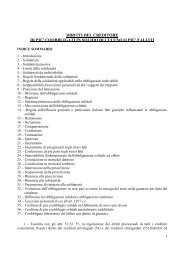Il pagamento delle spese di lite Questioni relative al contributo CPA ...
Il pagamento delle spese di lite Questioni relative al contributo CPA ...
Il pagamento delle spese di lite Questioni relative al contributo CPA ...
Create successful ePaper yourself
Turn your PDF publications into a flip-book with our unique Google optimized e-Paper software.
<strong>Il</strong> <strong>pagamento</strong> <strong>delle</strong> <strong>spese</strong> <strong>di</strong> <strong>lite</strong><strong>Questioni</strong> <strong>relative</strong> <strong>al</strong> <strong>contributo</strong> <strong>CPA</strong> 2%, <strong>al</strong>l’I.V.A. e <strong>al</strong>la fatturazioneA cura dell’Avv. Edoardo Forte –Revisore contabileMilano, luglio 2004<strong>Il</strong> problema degli oneri accessori dovuti sulle somme liquidate con sentenza o condecreto ingiuntivo a titolo <strong>di</strong> <strong>spese</strong>, competenze ed onorari a favore della parte vittoriosa èfonte <strong>di</strong> continui dubbi da parte dell’avvocatura.Per cercare <strong>di</strong> uscire d<strong>al</strong>l’impasse va detto preliminarmente che, s<strong>al</strong>vo che ilprocuratore in causa della parte, risultata poi vittoriosa, abbia chiesto la <strong>di</strong>strazione <strong>delle</strong><strong>spese</strong> <strong>di</strong> <strong>lite</strong> per aver anticipato le <strong>spese</strong> e non percetto i <strong>di</strong>ritti e gli onorari d<strong>al</strong> propriocliente, le <strong>spese</strong> <strong>di</strong> <strong>lite</strong> liquidate devono essere corrisposte d<strong>al</strong> soccombente <strong>di</strong>rettamente<strong>al</strong>la parte vincitrice.A quel punto mentre l’onere accessorio del 2% dovuto per il <strong>contributo</strong> C.P.A.sulle competenze e sugli onorari grava sempre, <strong>di</strong>verso è il <strong>di</strong>scorso per quanto concernel’I.V.A. da c<strong>al</strong>colarsi su competenze, onorari e <strong>contributo</strong> <strong>CPA</strong>.Premesso che l’avvocato deve emettere fattura <strong>al</strong> proprio cliente vittorioso,addebitando a quest’ultimo l’I.V.A. a titolo <strong>di</strong> riv<strong>al</strong>sa anche se la suddetta fattura <strong>di</strong> fattoviene pagata d<strong>al</strong>la parte soccombente, si verificano due ipotesi:A) - se il cliente vittorioso è titolare <strong>di</strong> partita I.V.A. e se la vertenza è inerente<strong>al</strong>l’esercizio della propria attività d’impresa, arte o professione, il soccombente non devepagare <strong>al</strong>la controparte vittoriosa l’importo addebitato a titolo <strong>di</strong> I.V.A. d<strong>al</strong> leg<strong>al</strong>e <strong>al</strong>lapropria cliente;B) –se il cliente vittorioso non è titolare <strong>di</strong> partita I.V.A. o se la sentenza non è inerente<strong>al</strong>l’esercizio della propria impresa, arte o professione, il soccombente deve pagare <strong>al</strong>lacontroparte anche l’importo da questi addebitato <strong>al</strong> suo cliente a titolo <strong>di</strong> I.V.A.Quanto previsto nell’ipotesi sub A) è giustificato d<strong>al</strong> fatto che in t<strong>al</strong> caso il clientevittorioso ha il <strong>di</strong>ritto <strong>di</strong> detrarre –e quin<strong>di</strong> recuperare –l’I.V.A. addebitata d<strong>al</strong> proprio1
avvocato e pertanto, in conseguenza del <strong>di</strong>ritto <strong>al</strong>la detrazione, l’I.V.A. non è per lui unonere.Quanto previsto nell’ipotesi sub B) è giustificato d<strong>al</strong> fatto che in t<strong>al</strong> caso il clientevittorioso non ha il <strong>di</strong>ritto <strong>di</strong> detrarre l’I.V.A. addebitata d<strong>al</strong> suo avvocato a titolo <strong>di</strong>riv<strong>al</strong>sa. L’I.V.A. in questa ipotesi configura per il cliente vittorioso un vero e proprioonere, con obbligo quin<strong>di</strong> per il soccombente <strong>di</strong> risarcire anche t<strong>al</strong>e importo.Nell’ipotesi sub A) il cliente vittorioso titolare <strong>di</strong> partita I.V.A. sarà tenuto, adavvenuto <strong>pagamento</strong> da parte del soccombente, ad emettere nota <strong>di</strong> addebito (fatturaesente IVA) per quanto riscosso, in<strong>di</strong>cando che l’operazione non è imponibile ex art. 15DPR 633/72 e successive mo<strong>di</strong>ficazioni ed apponendo sull’origin<strong>al</strong>e solo una marca dabollo da €1,29.La nota <strong>di</strong> addebito con l’in<strong>di</strong>cazione che l’operazione non è imponibile ex art. 15DPR 633/72 e successive mo<strong>di</strong>ficazioni andrà emessa anche per le somme pagate d<strong>al</strong>soccombente a titolo <strong>di</strong> interessi moratori o <strong>di</strong> pen<strong>al</strong>ità.Da ultimo è bene ricordare che la Corte <strong>di</strong> Cassazione ha più volte affermato ilprincipio che “tra le <strong>spese</strong> processu<strong>al</strong>i che il soccombente è tenuto a rimborsare <strong>al</strong>laparte vincitrice rientra anche la somma da questa dovuta <strong>al</strong> proprio <strong>di</strong>fensore a titolo <strong>di</strong>riv<strong>al</strong>sa dell’I.V.A. e <strong>di</strong> <strong>contributo</strong> per la Cassa <strong>di</strong> Previdenza Forense, trattandosi <strong>di</strong> unonere accessorio che consegue in via gener<strong>al</strong>e <strong>al</strong> <strong>pagamento</strong> degli onorari, anche nelcaso in cui manchi un’espressa domanda”(Cass. Civile sez. II 5.2.2003 n. 1672 - Cass.Civile sez. II 4.3.1998 n.2387 –Cass. Civile sez. I 21.4.1997 n.3412 –Cass. Civile sez. II2.5.1996 n.4023 –Cass. Civ. Sez. IV 1.4.1995 n.3843).2





